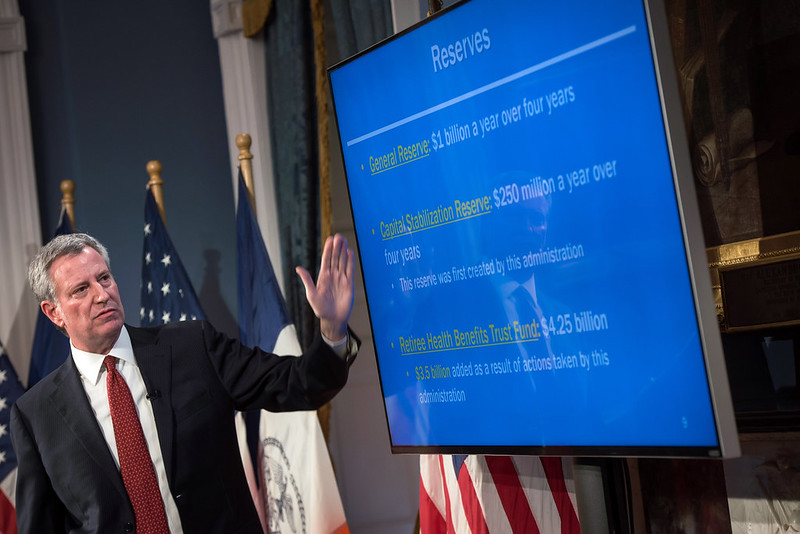
Mayor de Blasio gives a budget presentation (photo: Ed Reed/Mayoral Photo Office)
It is an axiom of media relations that when you don’t want something to get a lot of attention, you make it public at a time when few will be paying attention. So, the Friday before last week’s Thanksgiving holiday, when reporters and news consumers were getting ready to greet family, cook and/or travel, both Governor Cuomo and the Mayor de Blasio announced unsettling budget reports.
The governor released an update to the state’s four-year financial plan (required by law on October 31 but usually issued a few weeks late) and the Mayor released the required November mid-year modification to the current fiscal year (FY 2020) budget and revisions to the city’s financial plan for the subsequent three years.
This play did not work very well for the governor because the news was dramatic enough to overcome the timing of its release: due to the tremendous growth in the cost of Medicaid, the state’s operating deficit for the fiscal year that will begin on April 1, 2020 is now projected to exceed $6 billion and grow to $8.5 billion in 2023.
The mayor was more fortunate in that he did get by with very little news coverage of his budget revisions. But that doesn’t mean this information was unworthy of attention and concern. City spending in the current fiscal year is now expected to be $1.6 billion higher than was planned in the budget adopted by the City Council last June, a budget that was already $94.9 billion, or 3.1% more than the budget for the previous year (using Citizens Budget Commission’s adjusted figures).
In the course of the last six months, the mayor, often together with the Council, has announced a number of new initiatives and program expansions, for example higher wages for pre-kindergarten teachers and public defenders, criminal justice reforms (some required by state legislation), more mental health interventions. All of these efforts come at a cost, frequently including new hiring, and the cumulative impact can now be seen in the budget modification.
Headcount is up 1,148 positions in just the last six months. Current total city budgeted headcount is 334,581, growing to 336,005 in FY 2021, and 338,000 in FY 2022 and FY 2023 -- far exceeding the peak before the 2008 recession of 311,018. Not only do all these new hires mean more payroll now, but they will also go into the base for calculating the cost of city-provided pensions and health care benefits far into the future.
The mayor promises to offset much of the increased costs with savings, but most of the offsets are from interest re-estimates on debt service and reimbursements from the state and federal governments, not recurring efficiencies. Indeed, the administration’s commitment to achieving savings is waning: this November citywide savings plan is only 73% of the plans issued in November 2017 and 2018. Are there not far more ineffective or outmoded programs, procedures, and services that can be improved, streamlined, or eliminated?
It is good news that personal income and business tax revenue are projected to grow and that federal reimbursements and grants have been received to offset some of the new expenses, but neither will continue indefinitely and the possible negative impact of the severe change to the SALT deduction and newly adopted rent regulations on property values, on which much of city revenue depends, is yet to be determined.
Most worrisome is that the increased spending included in the November city budget modification is likely only a preview of even more spending growth. There is still time between now and the adoption of the final budget for the next fiscal year (due by June 30 2020) for there to be even more new initiatives added on that will need to be paid for with city funds.
In the FY 2019 budget cycle, between November 2018 and June 2019 the mayor and City Council added $2.5 billion to the annual budget. The increase over the same time period in the most recent budget cycle was $1.6 billion. If the mayor and Council speaker continue this pattern in the coming months, the FY 2021 budget could grow by another $2 billion or more by June.
With the state facing precarious times, it could well implement cuts to state-funded programs like Medicaid and school aid. Under the current circumstances, it cannot be expected that the federal government will help the state or city with budget shortfalls. To be prepared we need more reserves, more efficiencies, and an end to endless hiring.
***
Carol Kellermann was president of Citizens Budget Commission from 2008 through 2018.
***
Have an op-ed idea or submission for Gotham Gazette? Email This email address is being protected from spambots. You need JavaScript enabled to view it.